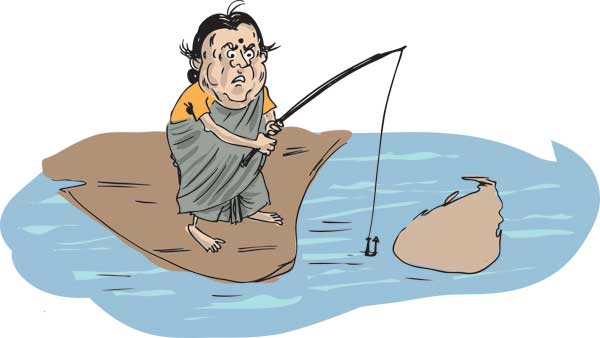
Barely one week after the ministerial-level talks held on January 14, between Sri Lanka and India on the fisheries crisis in the seas between the two countries, 25 Indian fishermen were arrested by the Navy near the Delft Island in the North.
Pointing to the deep political nature of the problem, Tamil Nadu Chief Minister Jeyalalithaa Jeyaram had protested against the arrest and warned that the much-awaited talks between the fishermen's associations of both countries which had been scheduled for January 27 would be jeopardised due to the arrest.
"The TULF, when it was the main Tamil coalition, and now its successor, the TNA have been no different."
In spite of the talks being held yesterday as scheduled in Chennai, the threat issued by the Tamil Nadu Chief Minister points to the attitude of the politicians towards a long-running vexed problem. It has now been a well established fact that the fishing dispute in the three seas around the northern part of Sri Lanka, the Bay of Bengal, the Bay of Palk and the Gulf of Mannar has been mainly due to the poaching by the Indian fishermen in Sri Lankan waters.
Trawling by big time fishing businessmen operating in Tamil Nadu has even posed a threat to the eco-system in the seas of that area that could result in a reduction of fish harvest in the long run.
However, the Tamil Nadu fishermen have been insisting that they be allowed to fish in the Sri Lankan waters during various talks held between the two parties since 2004.
But the 1976 agreement between Sri Lanka and India which determined the Maritime Boundary of the two countries clearly says that “The fishing vessels and fishermen of India shall not engage in fishing in the historic waters, the territorial sea and the exclusive economic zone of Sri Lanka nor shall the fishing vessels and fishermen of Sri Lanka engage in fishing in the historic waters, the territorial sea and the exclusive economic zone of India, without the permission of Sri Lanka or India, as the case may be.”
However, the issue has not been so plain as the wording of the agreement indicates since interests of politicians on either side of the Palk Strait play different roles in this regard. The Tamil Nadu leaders who constantly agitate in the name of the Sri Lankan Tamils heartlessly ruin the livelihood of a section of the same Sri Lankan Tamil people who had just started to rebuild their lives after a three-decade-long bloody war. They tend to find fault with the Sri Lankan Navy for arresting their fishermen but not with the latter for poaching or plundering the resources of the Tamil fishermen, as Jeyalalithaa did last week.
Interestingly, Tamil leaders in Sri Lanka are not too concerned about the northern Tamil fishermen whom they represent. The LTTE which attacked the fishing hamlets of Kokilay and Nayaru on December 1, 1984, killing 11 Sinhalese fishermen and injuring another 13 for fishing in the seas belonging to the Tamil people, never took up the poaching by the Indian fishermen in the Sri Lankan waters as an issue. In fact, the Indian poaching had been a blessing for them as their vessels too were able to mingle with the poachers in order to launch attacks against the Sri Lankan Navy.
The TULF, when it was the main Tamil coalition, and now its successor, the TNA have been no different. These rebels and politicians who profess that they fight for the Tamil people here have been receiving moral support for their struggles from across the Palk Strait for which they have betrayed the interests of a section of their own people.
If only the concerned laws of these two countries are allowed to take their course, the matter would be resolved to a great extent, but the politicians would not allow it to happen lest they lose the opportunity to fish in the troubled Straits.
